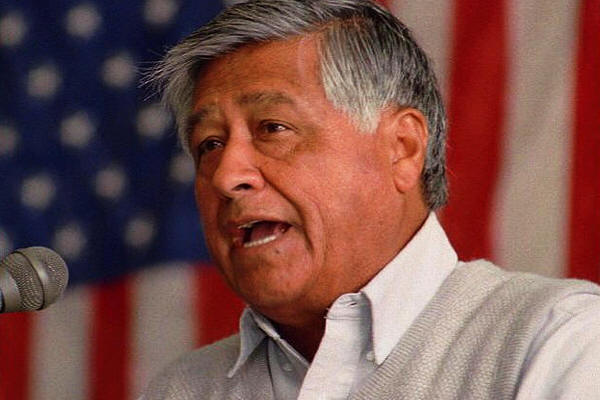|
|
March 31
César Estrada Chávez's Birthday
|
|
 |
| |
|
Civil rights has too
often been a catch phrase used by some politicians who cannot define what a
civil right is But César
Chávez, who was not a politician, knew the difference between right and
wrong which is the foundation of all civil rights and moral behavior. He
learned about justice and injustice early in life when his father was
swindled out of their Arizona home when César was ten years old."
That indelible experience may have influenced César, one of America's
great civil rights leaders, to never own a home. He always lived
simply, owned few possessions, and never earned more than $6,000 in a year,
Howeve, President Clinton, in
posthumously awarding Cesar the Medal of Freedom in 1994, declared,
"Cesar Chavez left our world better than he found it,
and his legacy inspires us still. He was for his own people a Moses figure.
The farm workers who labored in the fields pinned their hopes on this
remarkable man."
|
In 1962 César founded the National Farm Workers
Association, later to become the United Farm Workers (UFW). By 1970 the UFW
was able to persuade grape growers to accept union contracts and had
effectively organized most of that industry, at one point in time claiming
50,000 dues paying members. César made people aware of the struggles of farm
workers for better pay and safer working conditions. He succeeded through
nonviolent tactics (boycotts, pickets, and strikes). Cesar and the union
sought recognition of the importance and dignity of all farm worker.
On August 23, 1970, the Salad Bowl strike began
which was a series of strikes, mass pickets, boycotts, and secondary
boycotts which led to the largest
farm worker strike in US history. The
strike was led by the United Farm Workers against the International
Brotherhood of Teamsters. The bitter strike ended on March 26, 1971
when the Teamsters and UFW signed a new jurisdictional agreement reaffirming
the UFW's right to organize field workers. Afterwards César reminded
everyone that
“The fight is never about grapes or lettuce. It is always about people.”
The 1980's saw a decline in the UFW’s size,
and its national significance. Cesar and the UFW concentrated on educating
the public on the dangers of pesticides, both to consumers and farmworkers.
The farmworkers built a network of radio stations, and created low cost
housing for farmworkers.
After his death in 1993, César became a major
historical icon for the Latino community, and for liberals generally,
symbolizing militant support for workers and for Hispanic power based on
grass roots organizing. His supporters say his work led to numerous
improvements for union laborers. His birthday has become César Chávez Day, a
state holiday in eight US states. Many parks, cultural centers, libraries,
schools, and streets have been named in his honor in cities across the
United States.
So on César's birthday, an appropriate tribute
might be lettuce soup as a reminder of the challenges that farmworkers have
had to face to bring this staple to our tables. Enjoy it while watching
The Fight in the Fields: Cesar Chavez and the Farmworkers' Struggle
(2011).
|
|
|
|
|
Ingredients
|
|
1 large Vidalia onion, peeled and finely chopped
2 TB olive oil
2 garlic cloves, minced
2 medium potatoes, peeled and cubed
|
2 carrots, grated
1 head of lettuce, washed and cut into thin slices
5 cups of vegetable broth
salt and freshly ground pepper to taste |
|
|
|
Instructions
|
- In a large pot, heat oil over medium high heat until hot.
Add onions and sprinkle with a little salt, reduce heat to medium and sauté
until onions become translucent. Then add the garlic cloves and sauté for a
minute or two.
- Add the stock, potatoes, carrots,
lettuce, and salt and pepper. .Simmer for 20 -25 4minutes or until
everything is soft. Blend in a blender and salt and pepper to taste and
serve.
Serves 6-8 |
|
|
|
|
